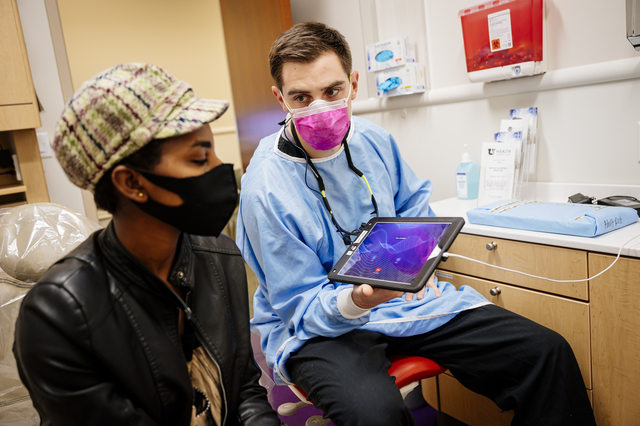Since the start of the pandemic, the International Rescue Committee (IRC) in Salt Lake City has swiftly responded by adapting program delivery and expanding services and areas of support. Two years into the pandemic, the IRC in Salt Lake City looks ahead to continuing to respond to the ongoing effects of the pandemic as well as strengthening the programs that were introduced since March 2020.
Health & Wellbeing
Thanks to long-term funding awarded by the Utah Department of Health, the IRC in Salt Lake City is working to improve current systems and implement new ones to respond to the pandemic and the complex challenges it causes. In 2021, the IRC in Salt Lake City held three COVID-19 vaccination clinics, helping 314 individuals receive at least one dose of the COVID-19 vaccine, and 286 to become fully vaccinated.

Brandon Smith, IRC’s local COVID response specialist, recently joined the team: “My role is to coordinate with the [Utah] Department of Health to ensure resources to vaccine access, testing, and quarantine and isolation are available,” he explains. From the Utah Department of Health, Brandon receives information, that he then delegates to IRC’s refugee community liaisons. “I assign our community health workers, or refugee community liaisons, to contact [individuals], assess their needs, and coordinate resources for that individual to ensure they have rent assistance or digital assistance, utility assistance… Anything that they may need to quarantine and isolate.” Refugee community liaisons, staff members at the IRC, come from refugee backgrounds or are members of refugee communities in Utah who work on COVID outreach and support for their communities.
Sheila Hubert, COVID navigator, joined the IRC in Salt Lake City in the fall of 2020, the first staff member to focus on a coordinated pandemic response role. Now she is part of a larger team, each member focusing on unique areas of the response.
Since Sheila joined during the pandemic, many of the services she has provided help address the unique challenges caused by the pandemic, including the inequalities it exposed. “I think the pandemic has really opened everybody’s eyes to what some gaps are,” Sheila says. “There are some things that we take for granted.” Sheila references knowing that she can find cough drops and a thermometer in her medicine cabinet, and food in her pantry she can survive off if she couldn’t leave her home for some time – but these things aren’t the reality for all community members.
Food Security
Addressing gaps in food security is one of the key areas of focus the pandemic expedited at the IRC in Salt Lake City. Two food entrepreneurship programs, New Roots and Spice Kitchen Incubator, have both played a large role in ensuring families have food staples, hot meals, and understand how to apply for food assistance programs.
Nourish to Flourish, an initiative founded by Sentry Financial, welcomed Spice Kitchen Incubator entrepreneurs to participate in 2020, supporting the preparation of culturally-appropriate hot meals that were delivered to community members in need. The initiative stabilized market access for a number of small culinary businesses while addressing food insecurity. In 2021, Spice Kitchen Incubator facilitated the delivery of 23,898 meals.
New Roots implemented Emergency Food Assistance (EFA), which provides several benefits to an interconnected community. Through the EFA program, farmers grow vegetables that then get picked up by Door Dash and delivered to those who need them. EFA provides an income for the farmers and food for those who may otherwise not be able to access a grocery store or afford the food their families need. In 2021, New Roots provided 1,550 boxes of emergency food assistance to families in need.
Education
The IRC in Salt Lake City’s Education Program has worked tirelessly to connect students with resources and support during the pandemic. To fill the gap that was left when after-school tutoring ended during the early months of the pandemic, the IRC in Salt Lake City began coordinating virtual tutoring for students. Hannah Oblock, refugee youth & education coordinator, shares that one of the focus areas for her team during the pandemic was to empower schools and school districts to provide care and consistent communications for parents of refugee students. “We’ve flipped more to focusing our energy around the schools needing to take more responsibility and reach out to the parents, instead of having parents be the ones to initiate so much.” By encouraging schools to become comfortable utilizing interpretation services and communicating more directly with refugee families, each student can get the support they need.
Working to close the digital divide has been a focused priority since before the start of the pandemic. Though the IRC in Salt Lake City’s Digital Inclusion program started well before the pandemic, the dramatic shifts to everyday life proved the need for increased digital inclusion and equity efforts for refugee and new American communities. Now, digital literacy is woven into other programs at the IRC in Salt Lake City, like cultural orientation.
Looking ahead, programs like Digital Inclusion will continue to be more important than ever, as Zoom meetings and virtual navigation have become the norm during the pandemic. Sheila notes how the need for making things accessible for all is more important now than ever, but accessibility and inclusion should not stop there. “We need to focus on the most vulnerable populations if we want to solve anything,” Sheila says.
Refugee and other new American communities were some of the most at-risk during the emergency response caused by the pandemic. However, through coordinated efforts across communities and with support from organizations, like the IRC in Salt Lake City, families continue to progress even under the most daunting of circumstances.
Help us ensure this important work continues as we all face the challenges of the pandemic. Learn how you can get involved at Rescue.org/SupportSLC »